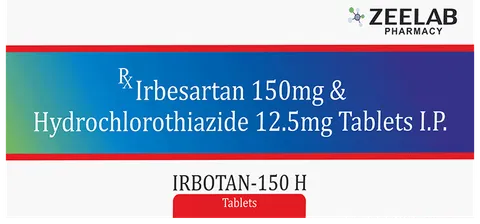Avalide (Irbesartan + Hydrochlorothiazide) Tablet
Generic
Irbesartan + Hydrochlorothiazide (Generic Equivalent to Avalide)
Irbesartan + Hydrochlorothiazide (Generic Equivalent to Avalide)
Irbesartan + Hydrochlorothiazide (Generic Equivalent to Avalide)
Avalide Tablet is a combination of two medicines. It helps to control high blood pressure in different ways. If high blood pressure is not treated it can lead to heart attacks, strokes and kidney failure.
You can take Avalide Tablet with or without food. The dose will depend on your condition and how you respond to the medicine. Try to take it at the same time each day. It is important to keep taking this medicine until your doctor tells you not to. It contains a diuretic (water pill) and will make you urinate more so, it is best to avoid taking this medicine within four hours of going to bed. Use this medicine regularly to get the most benefit from it even if you feel well. High blood pressure does not usually have symptoms and if you stop taking it your risk of heart attack or stroke may increase.
The most common side effect is dizziness. Other side effects include nausea, feeling tired, diarrhea, upset stomach, headache, and decreased blood pressure. Frequent urination is not a side effect of this medicine. It is the purpose of hydrochlorothiazide and helps control your blood pressure. You may experience other possible side effects, but most are rare. Hydrochlorothiazide may occasionally lead to an increase in pressure in your eye and lead to permanent eye damage if not treated. Make sure you read the leaflet that comes with your medicines and tell your doctor if you are bothered by side effects or they do not go away. It may be possible to adjust your dose or try a different medicine.
This medicine is not recommended during pregnancy or while breastfeeding and you should ask your doctor before taking it if you have kidney or liver disease, heart trouble or diabetes. Drinking alcohol can further lower your blood pressure and may cause side effects.
Uses Of Avalide Tablet
- Hypertension (high blood pressure)
Benefits Of Avalide Tablet
In Hypertension (High Blood Pressure)
Avalide Tablet is a combination of two medicines namely Irbesartan and Hydrochlorothiazide. It is generally used when one medicine alone is not controlling your blood pressure effectively. Irbesartan works by relaxing and widening your blood vessels so your blood can flow more easily. This will lower your blood pressure. Hydrochlorothiazide is known as a diuretic (water pill) which increases urine output thereby lowering blood pressure. If your blood pressure is controlled you are less at risk of having a heart attack, stroke, or kidney problems. The medicine must be taken regularly as prescribed to be effective. You do not usually feel any direct benefit from taking this medicine, but it works in the long term to keep you well.
Side Effects Of Avalide Tablet
Most side effects do not require any medical attention and disappear as your body adjusts to the medicine. Consult your doctor if they persist or if you’re worried about them.
Common Side Effects Of Avalide
- Nausea
- Taste change
- Upset stomach
- Diarrhea
- Weakness
- Dizziness
- Headache
- Glucose intolerance
- Increased blood uric acid
- Increased blood lipid level
- Electrolyte imbalance
- Decreased blood pressure
How To Use Avalide Tablet
Take this medicine in the dose and duration as advised by your doctor. Swallow it as a whole. Do not chew, crush or break it. Avalide Tablet may be taken with or without food, but it is better to take it at a fixed time.
How Avalide Tablet Works
Avalide Tablet is a combination of two medicines: Irbesartan and hydrochlorothiazide which lower blood pressure effectively. Irbesartan is an angiotensin receptor blocker (ARB). It works by blocking the hormone angiotensin thereby relaxing blood vessels. This allows the blood to flow more smoothly and the heart to pump more efficiently. Hydrochlorothiazide is a diuretic that removes extra water and certain electrolytes from the body. Over time it also relaxes blood vessels and improves blood flow.
Disclaimer :The information provided on the website is intended to facilitate awareness about healthcare products and medical conditions generally but it is not a substitute for professional medical attention or advice. You should always speak with a qualified healthcare practitioner before taking any prescription or non-prescription drug. |
| Product Type--Salt | Generic–Irbesartan + Hydrochlorothiazide (Generic Equivalent to Avalide) |
|---|---|
| tag--Manufacturer | Top Brand–Grownbury Pharmaceuticals, Best Selling–Zeelab Pharmacy, Top Brand–Globus Labs |
| Power--Pack Size | 100mg + 12.5mg–30 Tablets, 100mg + 12.5mg–60 Tablets, 100mg + 12.5mg–90 Tablets, 100mg + 12.5mg–180 Tablets, 150mg + 12.5mg–30 Tablets, 150mg + 12.5mg–60 Tablets, 150mg + 12.5mg–90 Tablets, 150mg + 12.5mg–180 Tablets, 150mg + 12.5mg–30 Tablets, 150mg + 12.5mg–60 Tablets, 150mg + 12.5mg–90 Tablets, Attribute 3 value(s), 150mg + 12.5mg–180 Tablets |


